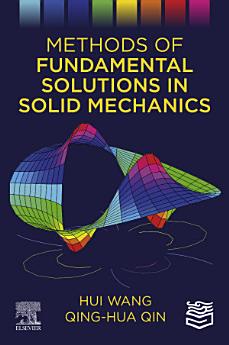Methods of Fundamental Solutions in Solid Mechanics
Jun 2019 · Elsevier
Ebook
312
Pages
family_home
Eligible
info
reportRatings and reviews aren’t verified Learn More
About this ebook
Methods of Fundamental Solutions in Solid Mechanics presents the fundamentals of continuum mechanics, the foundational concepts of the MFS, and methodologies and applications to various engineering problems. Eight chapters give an overview of meshless methods, the mechanics of solids and structures, the basics of fundamental solutions and radical basis functions, meshless analysis for thin beam bending, thin plate bending, two-dimensional elastic, plane piezoelectric problems, and heat transfer in heterogeneous media. The book presents a working knowledge of the MFS that is aimed at solving real-world engineering problems through an understanding of the physical and mathematical characteristics of the MFS and its applications. - Explains foundational concepts for the method of fundamental solutions (MFS) for the advanced numerical analysis of solid mechanics and heat transfer - Extends the application of the MFS for use with complex problems - Considers the majority of engineering problems, including beam bending, plate bending, elasticity, piezoelectricity and heat transfer - Gives detailed solution procedures for engineering problems - Offers a practical guide, complete with engineering examples, for the application of the MFS to real-world physical and engineering challenges
About the author
Dr. HUI WANG was born in Luoyang City of China in 1976. He received his Bachelor degree in Theoretical and Applied Mechanics from Lanzhou University, China in 1999. Subsequently he joined the College of Science as an assistant lecturer at Zhongyuan University of Technology (ZYUT) and spent two years teaching at ZYUT. He earned his Master degree from Dalian University of Technology in 2004 and Doctoral degree from Tianjin University in 2007, both of which are in Solid Mechanics. Since 2007, he has worked at College of Civil Engineering and Architecture, Henan University of Technology as a lecturer. He was promoted to Associate Professor in 2009 and Professor in 2015. From August 2014 to August 2015, he worked at Australian National University (ANU) as a visiting scholar, and then from February 2016 to February 2017, he joined the ANU as a Research Fellow.His research interests include computational mechanics, meshless methods, hybrid finite element method and mechanics of composites. So far, he has authored three academic books by CRC Press and Tsinghua University Press respectively, 7 book chapters and 62 academic journal papers (47 indexed by SCI and 8 indexed by EI). In 2010, He was awarded the Australia Endeavour Award.Dr. Qinghua Qin received his Bachelor of Engineering degree (1982) in Mechanical Engineering from Chang An University, China and obtained his Master of Science degree (1984) and PhD (1990) in applied mechanics from Huazhong University of Science and Technology (HUST), China. He joined the faculty of the Department of Mechanics at HUST from 1984 until he left for the University of Stuttgart (Germany) with the DAAD/K.C. Wong research fellowship in 1994. From 1995 to 1997, he returned to China as a postdoctoral associate at Tsinghua University.He was awarded the Queen Elizabeth II Fellowship from the Australian Research Council (ARC) in 1997 and a Professorial Fellowship of ARC in 2002 at The University of Sydney, Australia and stayed there till December 2003. He has been a Professor at the Research School of Engineering of the Australian National University, Australia from 2004 to 2021. He is now working at the Department of Engineering, Shenzhen MSU-BIT University, China. He is also appointed a guest professor at HUST since 2000 and Tianjin University since 2006.
Rate this ebook
Tell us what you think.
Reading information
Smartphones and tablets
Install the Google Play Books app for Android and iPad/iPhone. It syncs automatically with your account and allows you to read online or offline wherever you are.
Laptops and computers
You can listen to audiobooks purchased on Google Play using your computer's web browser.
eReaders and other devices
To read on e-ink devices like Kobo eReaders, you'll need to download a file and transfer it to your device. Follow the detailed Help Center instructions to transfer the files to supported eReaders.






